

Brer Anancy and the Magic Pot - Anansi Stories by V. S. Russell. Home - Rose Hall Jamaica. Review of the work GREAT RESOURCE 2016. Jamaica to the world: a study of Jamaican (and West Indian) epistolary practices. Miller, Andrew Kei (2012) Jamaica to the world: a study of Jamaican (and West Indian) epistolary practices.
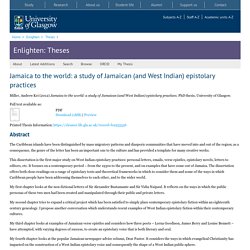
PhD thesis, University of Glasgow. Full text available as: The Caribbean islands have been distinguished by mass migratory patterns and diasporic communities that have moved into and out of the region; as a consequence, the genre of the letter has been an important one to the culture and has provided a template for many creative works. This dissertation is the first major study on West Indian epistolary practices: personal letters, emails, verse epistles, epistolary novels, letters to editors, etc. It focuses on a contemporary period – from the 1930s to the present, and on examples that have come out of Jamaica. My first chapter looks at the non-fictional letters of Sir Alexander Bustamante and Sir Vidia Naipaul.
My second chapter tries to expand a critical project which has been satisfied to simply place contemporary epistolary fiction within an eighteenth century genealogy. YouTube. The Cartographer Tries to Map a Way to Zion by Kei Miller. An extract i. in which the cartographer explains himself You might say my job is not to lose myself exactly but to imagine what loss might feel like – the sudden creeping pace, the consultation with trees and blue fences and whatever else might prove a landmark.
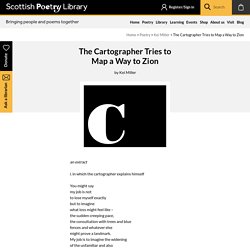
My job is to imagine the widening of the unfamiliar and also the widening ache of it; to anticipate the ironic question: how did we find ourselves here? My job is to untangle the tangled, to unworry the concerned, to guide you out from cul-de-sacs into which you may have wrongly turned. ii. in which the rastaman disagrees The rastaman has another reasoning. Iii. The cartographer says no – What I do is science. The Law Concerning Mermaids – The Missing Slate. Mermaid by Ankolie There was once a law concerning mermaids.
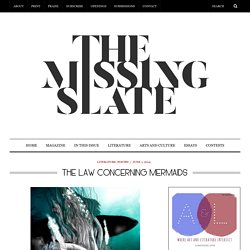
My friend thinks it a wondrous thing — that the British Empire was so thorough it had invented a law for everything. And in this law it was decreed: were any to be found in their usual spots, showing off like dolphins, sunbathing on rocks — they would no longer belong to themselves. And maybe this is the problem with empires: how they have forced us to live in a world lacking in mermaids — mermaids who understood that they simply were, and did not need permission to exist or to be beautiful.
The law concerning mermaids only caused mermaids to pass a law concerning man: that they would never again cross our boundaries of sand; never again lift their torsos up from the surf; never again wave at sailors, salt dripping from their curls; would never again enter our dry and stifling world. The True Size of Africa & Immapancy. Jamaican Patwah - Patois/Creole and Slang Dictionary. Rastafarian vocabulary. Rastafarian vocabulary I: replaces "me", which is much more commonly used in Jamaican English than in the more conventional forms.
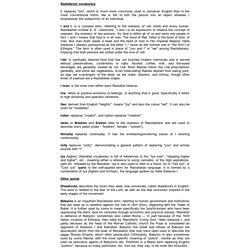
Me is felt to turn the person into an object whereas I emphasises the subjectivity of an individual. I and I: is a complex term, referring to the oneness of Jah (God) and every human. Rastafarian scholar E. E. I-tal: is spiritually blessed food that has not touched modern chemicals and is served without preservatives, condiments or salts. I man: is the inner man within each Rastafari believer. Irie: refers to positive emotions or feelings, or anything that is good. Ites: derived from English "heights", means "joy" and also the colour "red". Irator: replaces "creator", and Iration replaces "creation". Idren or Bredren and Sistren refer to the oneness of Rastafarians and are used to describe one's peers (male - "bredren", female - "sistren"). Itinually replaces continually. Other words H.I.M. Comment parler le patois Rastafari: 16 étapes. Kei Miller maps the intersections of race, class and privilege in Jamaica.
Jamaican writer Kei Miller is an original.

A prolific poet, novelist and essayist, he won the prestigious Forward Prize for Poetry for his fourth collection, The Cartographer Tries to Map a Way to Zion, in 2014. The book imagines a conversation between a mapmaker — a rationalist, trying to impose order on an unknown land — and a Rastafarian who questions the authority of maps, offering a different way of seeing the world. Miller draws on Jamaican history, religion and politics in his third novel, Augustown.
Rastafarian language. An extract from Rastafari: A Very Short Introduction In rejecting Babylon’s aesthetic of grooming and Babylon’s language conventions, Rastas have developed the iconic dreadlocks hairstyle and their own argot, commonly referred to as ‘dreadtalk’ or ‘Rasta talk’ and as ‘Iyaric’ by others.
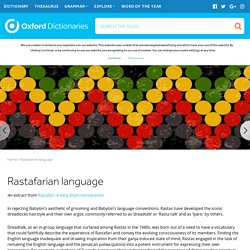
Under the Saltire Flag. 1.

Yesterday’s Ignorance My paternal great-grandmothers were ignorant women – one more so than the other. They did not mean Continue reading → 1. From Writing to Righting Say what you will of Dr Carolyn Gomes, even her worst critics must give her Continue reading → Like almost all modern and clever quotes, ‘I feel like a lion in the den of Daniels’ is often Continue reading → 1. Cancel Privacy & Cookies: This site uses cookies. Kei Miller. About Kei Miller "Raise high the roofbeams, here comes a strong new presence in poetry," wrote Lorna Goodison when Kei Miller burst onto the poetry scene with his 2006 debut Kingdom of Empty Bellies. Miller was born in Jamaica in 1978 and read English at the University of the West Indies, before completing an MA at Manchester Metropolitan University.
He has said in interview with Nicholas Laughlin, that the title and the themes of his first collection, stem from his belief that "so much of what is beautiful [in the Caribbean] comes out of depression and emptiness. " In 2007, he edited Carcanet's New Caribbean Poetry Anthology - a sparkling showcase for a range of Caribbean identities and experiences. Kei Miller's second collection There is an Anger that Moves, begins with the sequence 'In This Country', which explores an incomer’s experience of moving to the UK. An Interview with Kei Miller. A version of this conversation was broadcast on Writers & Company on CBC Radio One, produced by Sandra Rabinovitch. Kei Miller is an original. I first heard of him when his 2014 poetry collection, The Cartographer Tries to Map a Way to Zion, won England’s prestigious Forward Prize for Poetry. The book imagines a dialogue between a map-maker, a rationalist trying to impose order on an unknown land, and a Rastafarian—or Rastaman—who questions his project, offering a different way of understanding the world.
Kei Miller Interview LISTEN FROM 1.05. Prompt km 1ere. List of poems KEI MILLER. Discovering jamaica workshops. 2015WinterPOP ROSE STEEL. An Interview with Kei Miller. Power of the Pen Poetry Plays: Week 1 Part II Kei Miller. The epic journey of the plastic ducks. Kei Miller reads 'The Law Concerning Mermaids' Kei Miller - New Poems. IT'S A SIGN: "I think you’re never really satisfied with the books you write.
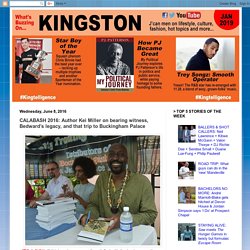
It’s always about finding a better way to write it," says the author, autographing books at the festival. “I’ve been travelling a lot more recently,” shares Kei Miller on this postcard-perfect Saturday afternoon at the Calabash Literary Festival in Treasure Beach, taking a five from his round-table chat with friends at Jake’s to bring KINGSTON Magazine up to speed on life du jour in the Miller-sphere. The neat crown of locks is gone, he has a much sturdier built than we remember, and his schoolboy smile is framed by a goatee these days.
For Kei Miller, the prize-winning and prolific author behind such acclaimed works as The Fear of Stones and The Last Warner Woman, change is good. And that certainly extends to his writing life. KINGSTON: During your reading earlier, you mentioned your visit to Buckingham Palace in the UK last year. KINGSTON: At your age, what’s left for you to accomplish?